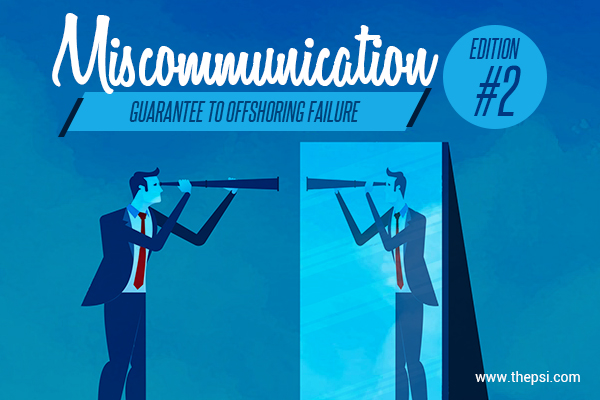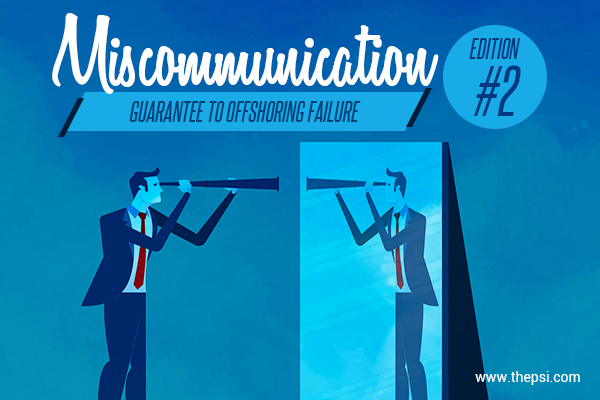
The key to any successful relationship is effective communication. For efficient outsourcing, it is essential to have effective communication between you and your outsourcing provider.
That being said, miscommunication is one of the most common causes that leads to an unsuccessful outsourcing relationship.
In our previous discussion on this topic, we’ve seen how miscommunication can lead to a dysfunctional outsourcing relationship. Some of the most common reasons for miscommunication that were discussed are:
- Language barriers: When your outsourcing provider and you do not speak the same language, or are unfamiliar with each other’s accent, vocabulary, and colloquialisms, it can lead to serious miscommunication. This happens because what each one says might be understood very differently by the other. When such a thing happens, it can lead to misunderstanding of requirements and output, this hampering a successful outsourcing effort
- Lack of adequate documentation: When there is no proper documentation of the requirements of a project and its ultimate objective, different people working on the project might interpret verbal instructions in different ways. As a result, the outcome of the project might turn out to be far from your expectations. This can disrupt the relationship with your provider and also cost you time, money and resources.
- Lack of trust: There needs to be mutual trust between you and your outsourcing provider. If you do not trust them adequately, they would feel less engaged and accountable for the project outcome. If your outsourcing provider is less invested in the project, it is natural that the quality of services will not be great. This will hamper the experience for your clients and will cost you dearly.
- Lack of feedback: Feedback from clients needs to be shared with the developers so that they understand what’s working and what’s not. Without proper feedback sharing procedures, your project team might deliver something that is not in line with your client’s expectations. This means that the developers might need to re-do the work. Not only is this a waste of their productivity but also creates dissatisfaction for both your client as well as your outsourcing provider.
Continuing from where we left off last time, we shall see some more examples of how miscommunication can lead to offshoring failure and how you can prevent it.
Time Zone Differences
In IT outsourcing processes, more often than not, it happens that you and your outsourcing provider are based in completely different locations and hence different time zones. For example, this report by A.T. Kearney shows that India remains the top offshoring location.

Image via A.T. Kearney
This makes effective communication extremely difficult as both your work timings are different. As a result of this, you might not be able to communicate something essential to your outsourcing provider on time. This might lead your outsourcing provider to re-do some work done previously.

It goes without saying that all of this eventually leads to frustration and dissatisfaction that might lead to outsourcing failure.
It is therefore important to schedule regular meetings at a time that is mutually convenient to both parties. These meetings should be used for tracking project progress and actionables.
Cultural Differences
When you and your outsourcing service providers are based in different parts of the world, it is natural that you both belong to very different cultures. Believe it or not, this can be a barrier to effective communication.
For example, because of the different culture and customs prevalent in your respective countries, you might have holidays and festivals at different times. This means that you or your outsourcing provider might be unavailable when needed by the other.
To avoid such issues, it is important for you and your outsourcing providers to share the list of holidays in your respective countries with each other. This will ensure that you both are aware of when the other will be unavailable and plan your work accordingly.
It is also necessary to have cultural alignment in the way each of you do business. For example, if you attach a lot of importance to retaining your employees whereas your outsourcing partner has a high attrition rate, the relationship will not be beneficial to you both.
To avoid this, it is essential to be open and honest and ask these questions at the onset of your partnership.
Lack of Clear Expectation-setting
A lot of times, it so happens that companies fail to explain to their outsourcing providers, how the outsourced project fits into the overall scheme of things at their end, and the objective behind it.
If your outsourcing provider does not get the bigger picture, it is likely that the output might not be aligned with your expectations.
To avoid such frustrations and wasted efforts, it is important to let your outsourcing provider know what your business objectives are. You also need to explain to them clearly, how the outsourced part fits into your business goals so that they understand your expectations.
Once the objectives have been shared, it is necessary for you to share what your outsourcing provider needs to deliver. Without this, there is likely to be project delays which will drive up your costs, time to completion and create dissatisfaction.
It is therefore, necessary for you to be clear about project deadlines. Also identify significant milestones that can be tracked. This will help to ensure that your project progress is on time.
Conclusion
As with all relationships, you need to invest a lot of time in nurturing your relationship with your outsourcing provider to make it a success. Invest time in communicating effectively with each other. Set up a process of having regular catch-ups where you can share client feedback as well as track progress of your project.
Also make sure that both of you understand each other well in terms of your objectives and are transparent with each other. This can lead to the formation of a rock-solid relationship which will help in maximizing your returns from the outsourcing.
If you are looking for an outsourcing partner you believe in effective communication and will help you achieve your goals in a timely manner, speak to us now!
The key to any successful relationship is effective communication. For efficient outsourcing, it is essential to have effective communication between you and your outsourcing provider.
That being said, miscommunication is one of the most common causes that leads to an unsuccessful outsourcing relationship.
In our previous discussion on this topic, we’ve seen how miscommunication can lead to a dysfunctional outsourcing relationship. Some of the most common reasons for miscommunication that were discussed are:
- Language barriers: When your outsourcing provider and you do not speak the same language, or are unfamiliar with each other’s accent, vocabulary, and colloquialisms, it can lead to serious miscommunication. This happens because what each one says might be understood very differently by the other. When such a thing happens, it can lead to misunderstanding of requirements and output, this hampering a successful outsourcing effort.
- Lack of adequate documentation: When there is no proper documentation of the requirements of a project and its ultimate objective, different people working on the project might interpret verbal instructions in different ways. As a result, the outcome of the project might turn out to be far from your expectations. This can disrupt the relationship with your provider and also cost you time, money and resources.
- Lack of trust: There needs to be mutual trust between you and your outsourcing provider. If you do not trust them adequately, they would feel less engaged and accountable for the project outcome. If your outsourcing provider is less invested in the project, it is natural that the quality of services will not be great. This will hamper the experience for your clients and will cost you dearly.
- Lack of feedback: Feedback from clients needs to be shared with the developers so that they understand what’s working and what’s not. Without proper feedback sharing procedures, your project team might deliver something that is not in line with your client’s expectations. This means that the developers might need to re-do the work. Not only is this a waste of their productivity but also creates dissatisfaction for both your client as well as your outsourcing provider.
Continuing from where we left off last time, we shall see some more examples of how miscommunication can lead to offshoring failure and how you can prevent it.
Time Zone Differences
In IT outsourcing processes, more often than not, it happens that you and your outsourcing provider are based in completely different locations and hence different time zones. For example, this report by A.T. Kearney shows that India remains the top offshoring location.

Image via A.T. Kearney
This makes effective communication extremely difficult as both your work timings are different. As a result of this, you might not be able to communicate something essential to your outsourcing provider on time. This might lead your outsourcing provider to re-do some work done previously.

It goes without saying that all of this eventually leads to frustration and dissatisfaction that might lead to outsourcing failure.
It is therefore important to schedule regular meetings at a time that is mutually convenient to both parties. These meetings should be used for tracking project progress and actionables.
Cultural Differences
When you and your outsourcing service providers are based in different parts of the world, it is natural that you both belong to very different cultures. Believe it or not, this can be a barrier to effective communication.
For example, because of the different culture and customs prevalent in your respective countries, you might have holidays and festivals at different times. This means that you or your outsourcing provider might be unavailable when needed by the other.
To avoid such issues, it is important for you and your outsourcing providers to share the list of holidays in your respective countries with each other. This will ensure that you both are aware of when the other will be unavailable and plan your work accordingly.
It is also necessary to have cultural alignment in the way each of you do business. For example, if you attach a lot of importance to retaining your employees whereas your outsourcing partner has a high attrition rate, the relationship will not be beneficial to you both.
To avoid this, it is essential to be open and honest and ask these questions at the onset of your partnership.
Lack of Clear Expectation-setting
A lot of times, it so happens that companies fail to explain to their outsourcing providers, how the outsourced project fits into the overall scheme of things at their end, and the objective behind it.
If your outsourcing provider does not get the bigger picture, it is likely that the output might not be aligned with your expectations.
To avoid such frustrations and wasted efforts, it is important to let your outsourcing provider know what your business objectives are. You also need to explain to them clearly, how the outsourced part fits into your business goals so that they understand your expectations.
Once the objectives have been shared, it is necessary for you to share what your outsourcing provider needs to deliver. Without this, there is likely to be project delays which will drive up your costs, time to completion and create dissatisfaction.
It is therefore, necessary for you to be clear about project deadlines. Also identify significant milestones that can be tracked. This will help to ensure that your project progress is on time.
Conclusion
As with all relationships, you need to invest a lot of time in nurturing your relationship with your outsourcing provider to make it a success. Invest time in communicating effectively with each other. Set up a process of having regular catch-ups where you can share client feedback as well as track progress of your project.
Also make sure that both of you understand each other well in terms of your objectives and are transparent with each other. This can lead to the formation of a rock-solid relationship which will help in maximizing your returns from the outsourcing.
If you are looking for an outsourcing partner you believe in effective communication and will help you achieve your goals in a timely manner, speak to us now![:]








